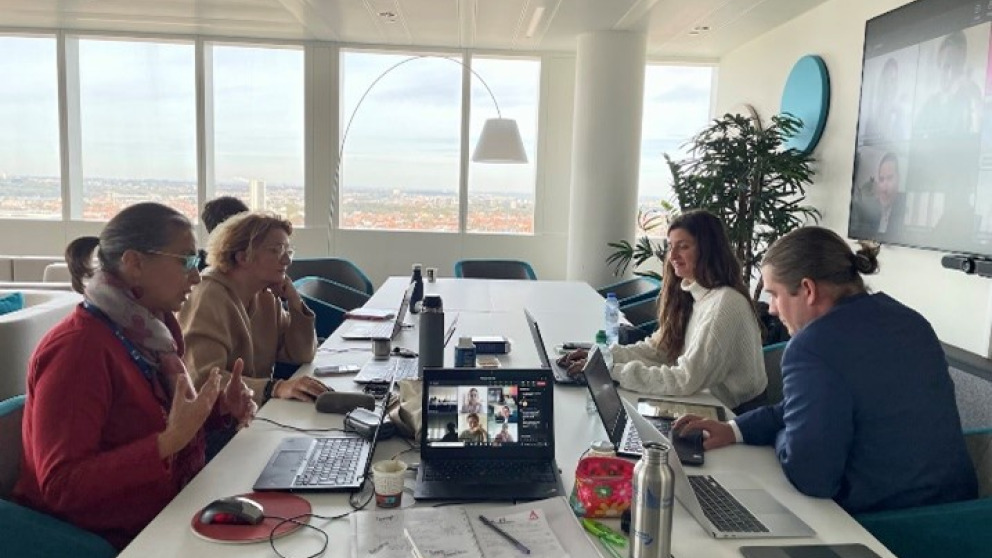Organizational Transformation in the European Commission
24.11.2023

A systemic sustainability transformation requires fundamental shifts in various areas of society. A particularly persistent need for change lies in the organisational structures of political administration and decision-making. Here, many of the prevailing structures stem from rather traditional mindsets that are ill-suited to the complex, interconnected crises and challenges facing societies today. Traditional administrative structures lack resilience and adaptability, particularly as many of the people working within these structures suffer from excessive workloads and are frustrated by what they experience as a lack of agency. This is reflected by rising rates of burnout and other poor health outcomes.
Against this background, one important interest of the research group TranS-Mind (Transformative Spaces and Mindsets) lies in the exploration and fostering of processes and structures that allow individuals and groups of people to take transformative action in a healthy environment. Recently, the TranS-Mind team had the opportunity to learn about new and innovative approaches within the European Commission (EC) that aim to address these issues.
Valerie Voggenreiter and Antonella Tarallo, from the Corporate Organisational Change Unit (HR Unit A3) of the Directorate-General for Human Resources and Security (DG HR) identified overlaps in their understanding of transformation. This opened a window of opportunity for mutual learning and inspiration between TranS-Mind and the HR Unit A3. We were interested to learn that the Information Management Steering Board of the European Commission recently established the Centre for Organisational Transformation (Centre): a team of approximately 35 members of staff (policy officers and scientists) from different departments of the EC, such as DG HR, the Joint Research Centre (JRC), the IT department, the Secretariat-General and the Directorate-General for Communications Networks, Content and Technology. It was set up to support the EC in transforming its work practices by adopting participatory leadership methods, for example. More specifically, the Centre provides:
• Consultancy, strategic advice, and support on transformation processes and collaboration
• Capacity building and helping colleagues embrace more collaborative and flexible ways of working.
• Coordination of the Collaboration Hub, a community of practice for organizational transformation.
• Scientific advice on knowledge sharing, collaboration and new ways of working.
• Establishing strategic partnerships with other bodies within and outside the EC.
In October, Felix Beyers, Thomas Bruhn, and Valerie Voggenreiter visited the colleagues from DG HR in Brussels to better understand the Centre’s work and explore potentials for further collaboration.

We were able to participate in a series of regular meetings, including a team reflection and a meeting of the management board of DG HR. This allowed us to dive deeper into the internal logic and structure of the institution. We have perceived many common areas of interest as well as resonances in relation to our research interest in participatory formats and dialogue. Participatory leadership practices and principles have been used for decades within the EC to push organizational boundaries from top-down decisions towards fostering more integrated outcomes.
Additionally, a significant overlap was a deep concern for the people in our respective work environments, who perform their tasks with great dedication within high pressure, hierarchical, solution- and result-oriented structures. Similarly, like the TranS-Mind team, the Centre aspires to support colleagues by facilitating change from within, e.g., through communities of practice, designing participatory leadership seminars and the use of co-creative methods as well as their scientific interest regarding what that means for greater impact. We found that our colleagues at the EC face similar challenges and questions: How can the tension between structural pressure and the pursuit of creative freedom become a resource for positive change? Which structures enable or prevent profound change and can realistically be shifted from within? Which elements of the "old" structure can possibly also be let go of? Which other elements need to be re-invited in return? How much transformative action is possible "from within" and to what extent is it necessary to involve reflective partners from outside to overcome one's own biases? And who can take the risk and responsibility for these changes and "legitimise" or "mandate" new and perhaps experimental approaches?
Both institutions strive for organizational transformation and thereby promote internal and external collaboration and partnerships. Both are sensitive to creating a meaningful and healthy work environment, considering leadership personalities, roles, and staff culture. However, both need to break up or push against long-standing rigid organizational structures. For example, the Centre’s focus on participatory leadership practices and principles stems from specific decisions by Commission leaders who have taken the risk to try out now pathways and require broader staff acceptance for organizational shifts. Institutionalizing such transformative principles therefore requires context sensitivity and long-term commitment. This is challenging in practice, especially as contextual conditions change (e.g., after the European elections in June 2024). Nevertheless, the existing experiments are already building transformative capacity and provide many insights for other who move towards similar directions.
We are grateful and inspired by the insights and experiences we were able to gain and impressed by the efforts that we witnessed within the EC. Trans-Mind and the Centre for Organisational Transformation strive to create breathing spaces in-between existing organisational structures, acknowledging the value of (internal and external) reflection to further develop our influence on desired transformation processes. Together, we explored the balance between joy and pressure, science and practice, and the importance of resilience and adaptability in this endeavour. Certainly, we will continue to explore what next steps can emerge for our teams and institutions in our transdisciplinary collaboration and partnership.


